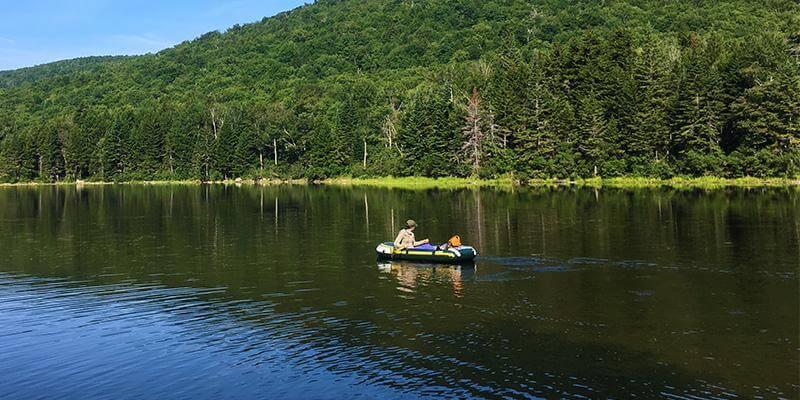In 2019, master’s student Sydney Diamond began studying lakes in Vermont that were impaired by acid rain in the 1950s and 1960s. She was in the middle of analyzing long-term water chemistry trends and current phytoplankton communities to assess chemical and biological recovery in these sensitive surface waters. With lab closures in early spring 2020 due to COVID-19, Diamond could not complete her sample analysis and data collection necessary for part of her thesis.
In response to the negative impacts of COVID-19 on graduate student research progress since spring semester 2020, the UVM Rubenstein School of Environment and Natural Resources directed funds from the Steven Rubenstein Scholarship Fund to help students get back on track. The Rubenstein Scholarship Fund was established by philanthropic support from the Steven and Beverly Rubenstein Charitable Foundation, a longtime benefactor of the School.
“I feel extremely grateful to be a recipient of Rubenstein Graduate Student Assistance Funds,” said Diamond. “It has helped me finish up my graduate degree by providing financial support during an otherwise stressful and unpredictable time.”
The special assistance fund currently supports nine graduate students in the Rubenstein School whose research and field work were suspended at a critical juncture. COVID-19 impacts range from a disruption in writing and data analysis to interruption of an entire field season.
“The pandemic has definitely thrown a wrench in things,” said Lisi Lohre, a master’s student developing an adaptive framework, involving local stakeholders, for sustainable management of cashmere goats in Mongolia. Due to COVID-related budget cuts and travel restrictions, she was unable to complete the final phase of the project with key partners. “Being unable to return to Mongolia to share my work and continue my relationships with stakeholders is incredibly disappointing.”
![]()
Rubenstein School graduate student Lisi Lohre works with local stakeholders in Mongolia to develop a framework for sustainable management of cashmere goats. Her research program came to a standstill in spring 2020 due to COVID-related budget cuts and travel restrictions. With crucial funding assistance, she is now completing her program.
"The pandemic brought my research with high schools across Vermont to a halt last spring," said Joshua Morse, a PhD student who has been gathering Vermonters' stories about the eastern coyote to use as a dataset to examine peoples' perceptions and values of wildlife. Morse provides skill-building experiences to high school students and guides them as they learn to interview community members to answer research questions about peoples’ experiences with coyotes for policymakers and wildlife managers.
"COVID relief from the Rubenstein Graduate Student Assistance Funds allowed me to extend my dissertation timeline and sustain my community partnerships," said Morse. "I am extremely grateful to be able to keep this citizen science opportunity for Vermont high schools alive at a time when so much in education is uncertain."
![]()
Rubenstein School PhD student Joshua Morse trains high school students as citizen scientists to help him build a state-wide dataset in Vermont through his project Coyote Stories, a collection of peoples' experiences with coyotes. COVID-19 interrupted his work in schools and communities, but financial assistance from the Rubenstein School and remote technology has helped Morse pick up where he left off in gathering stories, providing educational benefits to communities, and equipping decision makers with a tool to understand how society values wildlife.
Rubenstein School students, like Diamond, Lohre, and Morse, face the loss of original research funding that will not be supplemented by the funding agency to extend their research programs. With no-cost extensions the only option, graduate students are left with reduced or no funding to complete their program.
To confront these unfunded program extensions, Rubenstein School Dean Nancy Mathews directed funding from the scholarship fund, originally created by the Rubenstein family to support students, to assist graduate students who have experienced a significant delay in their research program because of COVID-19 and who do not have additional funding to extend their program.
“When Beverly and Andrew Rubenstein created the Steven Rubenstein Scholarship Fund ten years ago, they had the foresight to structure it in such a way to be responsive to the needs of the day,” said Mathews. “While they did not imagine a global pandemic at the time, their careful planning made it possible for us to provide critical support to graduate students in need.”
The funding will primarily cover students' full or partial graduate research assistantship for one semester. Other extraordinary expenses, to ensure completion of their research and degree, may also be covered.
“Having research funding for this fall through the Rubenstein Graduate Student Assistance Funds has alleviated much of the pressure I was feeling,” said Lohre. “It literally bought me more time to complete my thesis and successfully round out my Master’s program. I am incredibly grateful to the Rubenstein family for helping graduate students like me.”
In 2003, the late Steven Rubenstein ‘61 and his wife Beverly made a $15 million commitment to support environmental education and research at UVM. A component of the gift supports the Steven Rubenstein Scholarship Fund. The Rubensteins' son, Andrew, has maintained the family’s generous support of the School, and both he and Beverly serve on the Rubenstein School Board of Advisors.
